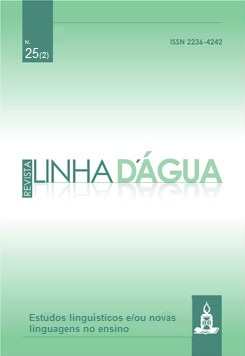Ditransitive sentences and indirect object in Bazilian Portuguese
DOI:
https://doi.org/10.11606/issn.2236-4242.v25i2p25-50Keywords:
Applicative, Dative, European Portuguese, Brazilian Portuguese, Ditransitivity.Abstract
In this paper, the syntax of dative arguments (indirect objects) in Brazilian Portuguese is examined in a crosslinguistic perspective with European Portuguese. It is shown that the grammatical expression of BP indirect object has undergone significant changes, which were essentially triggered by two related phenomena: a decrease in the use of the preposition a introducing the indirect object, which is replaced by the preposition para, and a decrease in the use of the dative pronoun, particularly the 3rd person clitic lhe(s),which is substituted for innovative strategies of pronominalization. In European Portuguese, differently from BP, dative arguments are consistently introduced by the preposition a, and pronominalization involves the 3rd person dative clitic lhe(s). Based on the theory of applicative heads proposed in Pylkkänen (2008) and a particular notion of ditransitivity, proposed in Cuervo (2003/2010), we take these changes as evidence for the loss of the low applicative construction in Brazilian Portuguese, coupled with the loss of the morphosyntactic ditransitivity. Thus the connection between the morphological case system and the expression of parameters supports a view of syntactic change according to which parametric variation is determined in the lexicon, in terms of the grammatical features of functional heads.
Downloads
Downloads
Published
Issue
Section
License
The Editorial Board authorizes free access to and distribution of published contentes, provided that the source is cited, that is, granding credit to the authors and Linha D'Água and preserving the full text. The author is allowed to place the final version (postprint / editor’s PDF) in an institutional/thematic repositor or personal page (site, blog), immediately after publication, provided that it is available for open access and comes without any embargo period. Full reference should be made to the first publication in Linha D'Água. Access to the paper should at least be aligned with the access the journal offers.
As a legal entity, the University of São Paulo at Ribeirão Preto School of Philosophy, Sciences and Languages owns and holds the copyright deriving from the publication. To use the papers, Paidéia adopts the Creative Commons Licence, CC BY-NC non-commercial attribution. This licence permits access, download, print, share, reuse and distribution of papers, provided that this is for non-commercial use and that the source is cited, giving due authorship credit to Linha D'Água. In these cases, neither authors nor editors need any permission.
Partial reproduction of other publications
Citations of more than 500 words, reproductions of one or more figures, tables or other illustrions should be accompanied by written permission from the copyright owner of the original work with a view to reproduction in Linha D'Água. This permission has to be addressed to the author of the submitted manuscript. Secondarily obtained rights will not be transferred under any circumstance.










